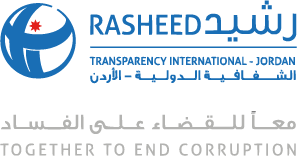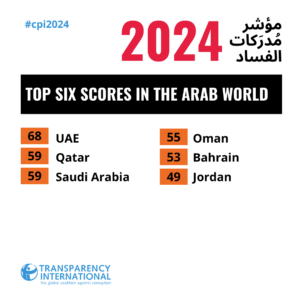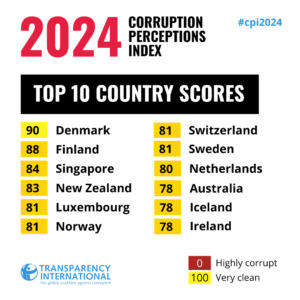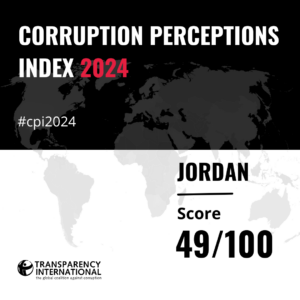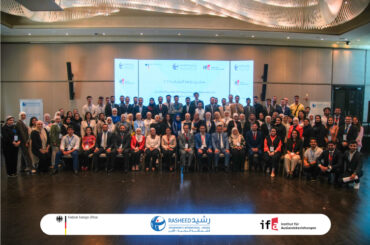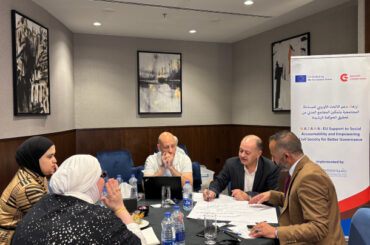- Jordan has made progress of three points compared to 2023, achieving a score of 49 out of 100 on the 2024 Corruption Perceptions Index and ranking 59 out of 180 countries and regions assessed.
- In the Arab world, Jordan ranked sixth, following the UAE, Qatar, Saudi Arabia, Oman, and Bahrain.
- Globally, Denmark achieved the highest, followed by Finland, then Singapore, and New Zealand.
Rasheed (TI – JO), the national chapter of Transparency International, released today the results of the 2024 Corruption Perceptions Index (CPI). The index is based on evaluations from eight independent international sources, reflecting the views of economic experts and business executives.
The index relies on data collected through surveys and specialized perception polls conducted by independent international institutions. These institutions measure the CPI on a scale from 0 (highest level of corruption) to 100 (highest level of integrity) and then calculate the average score.
The CPI evaluates a range of topics that concern the public interest, such as, the government’s ability to reduce bribery, activate accountability mechanisms, monitor the use of public funds, prevent embezzlement, and limit the exploitation of officials’ positions for personal gain. The Index also evaluates the government’s ability to reduce corruption and routine and bureaucratic procedures that contribute to increasing the chances of corruption, as well as nepotism and favoritism in public job appointments, the prosecution of corrupt individuals, the protection of whistleblowers and journalists, and the public’s ability to access information. Additionally, the index evaluates the available space for accountability for citizens and civil society organizations, and the capacity to achieve justice and the rule of law.
The CPI does not measure activities such as tax fraud, money laundering, financial secrecy, illicit flows of dirty money or other forms of private sector corruption.
The CPI provides governments with an overview of the effectiveness of their efforts in fighting corruption and strengthening integrity systems. Investors also use it as a tool to assess corruption-related risks, helping determine whether a country is a secure investment destination. Additionally, international institutions use the index as a tool to rank countries and evaluate the effectiveness of their efforts in promoting good governance and achieving justice in the public sector.
Jordan’s score in the 2024 Corruption Perceptions Index is assessed based on eight international sources:
- Bertelsmann FDN Transformation Index
- Economist Intelligence Unit Country Ratings
- Global Insight Country Risk Ratings
- World Competitiveness Yearbook
- Political Risk Services International Country Risk Guide
- Varieties of Democracy Project
- World Economic Forum EOS
- World Justice Project Rule of Law
In the Arab world, Jordan ranked sixth, following the UAE 68, Qatar 59, Saudi Arabia 59, Oman 55, and Bahrain 53. Both Oman and Bahrain made significant progress on the index this year, with Oman improving by 12 points and Bahrain by 11 points, which caused Jordan’s position to drop from fourth to sixth within the Arab countries’ ranking.
Meanwhile, Libya and Yemen both scored 13, Syria scored 12, Somalia scored 9, and South Sudan, the lowest on the index, scored 8.
Globally, Denmark achieved the highest score with 90, followed by Finland with 88, Singapore with 84, and New Zealand with 83.
By examining the evaluation of Jordan’s score on the index and the sources that contributed to its improvement, we find that most of these sources focus on measuring bribery levels in the public sector. The automation of government services played a significant role in this progress, as it is an effective method to reduce opportunities for bribery and corruption. Despite this, there is still a need to address the following recommendations:
- Legislative and International Frameworks
- Expedite the alignment of national legislation with the United Nations Convention Against Corruption (UNCAC), as well as relevant bilateral and multilateral agreements and commitments.
- Ensure that all proposed legislation complies with international charters and conventions related to civil, social, political, and economic rights before submission to Parliament.
- Bolster the independence of the judiciary and oversight bodies by ensuring financial and administrative autonomy, while enhancing their capacities and expanding their mandates to cover all sectors funded by the national budget.
- Good Governance and Anti-Corruption Practices
- Fostering a culture of integrity, transparency, and accountability.
- Institutionalize a culture of integrity, transparency, and accountability across all sectors, embedding these principles into educational curricula, public discourse, and religious institutions.
- Develop a comprehensive National Integrity System, extend its application to all sectors, and enhancing citizen feedback mechanisms.
- Work on standardizing electronic and paper forms related to the right to access information across all government institutions and agencies.
- Ensure the robust implementation of whistleblower protection systems and encourage public reporting of corruption through diverse and secure channels, while offering psychological support for individuals affected by corruption, in line with best international practices.
- Actively prosecute corruption cases to ensure justice while maintaining the principles of due process.
- Introduce incentive structures to motivate public employees to report unethical practices and corruption.
- Address institutional weaknesses to prevent the misuse of public funds or abuse of authority for personal gain, while strengthening mechanisms for oversight and reporting.
- Transparency in Public Spending and Access to Information
- Ensure proactive disclosure of public information through accessible electronic platforms, fostering accountability, reducing misinformation, and rebuilding citizen trust.
- Publish regular updates on the implementation of recommendations from Audit Bureau reports.
- Transparently report donations to emergency and disaster relief funds, including details on procurement, bids, expenses, and payments, subjecting these funds to rigorous oversight by the Audit Bureau.
- Regularly update and disclose financial declarations of parliamentarians and senior government officials to promote accountability.
- Public Procurement and Contract Management
- Adhere to rigorous and transparent standards in selecting technical and professional committees for public procurement, ensuring that all decisions are publicly disclosed.
- Establish centralized, transparent registries for foreign companies bidding on public contracts to mitigate conflicts of interest and promote fair competition.
- Establish transparent central registers for foreign companies bidding on public contracts and purchasing real estate.
- Freedom of Expression and Civil Society Engagement
- Safeguard freedom of speech, expression, and peaceful assembly and amending the cybercrime law to create a secure environment for the media, civil society organizations and the citizens in general for participation and accountability.
- Public Sector Appointments
- Ensure full transparency in government hiring processes by disclosing selection criteria and outcomes for all stages of recruitment.
- Monitor and regulate the “revolving door” practice between the public and private sectors by implementing suitable transition periods and enforcing deterrent penalties for non-compliance.
- E-Government Development
- Intensify efforts to verify the accuracy of governmental records (e.g., land ownership data) while expanding the availability and usability of e-government services.
- Increase public adoption of the digital identity system through the Sanad application by addressing usability barriers and promoting its benefits.
Rasheed for Integrity and Transparency (Transparency International – Jordan) is a non-profit civil society organization, established end of 2013, and is the only national chapter of Transparency International in Jordan. It aims to strengthen the pillars of good governance based on transparency, integrity, accountability, and the rule of law, raise the level of integrity and combat corruption in the public and private sector, and enhance the awareness of individuals from various sectors of the importance of transparency, accountability and reporting on corruption, in addition to strengthening the legal and executive frameworks of the national integrity system, through communication cooperating and exchanging experiences with international, regional and national organizations and working to expand the circle of data and information available to citizens.

